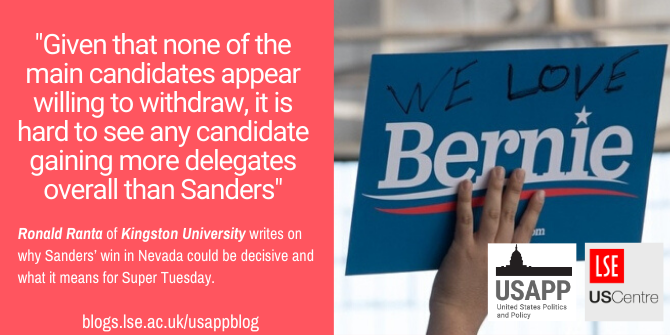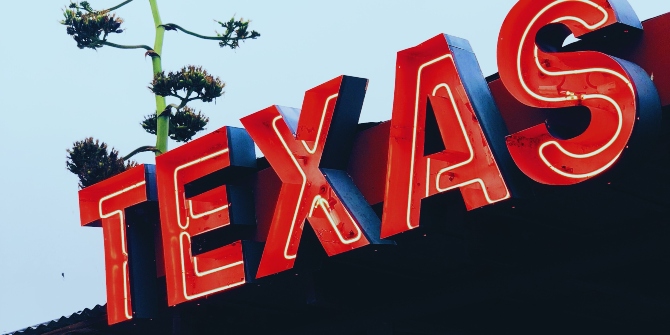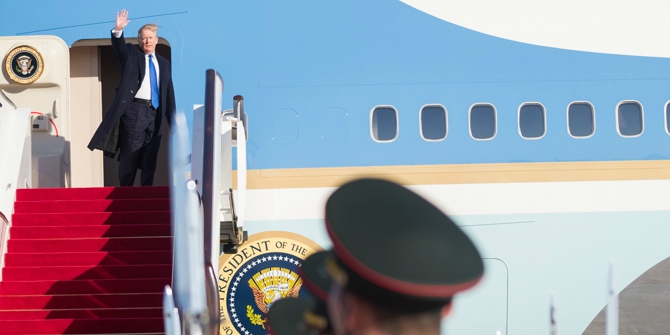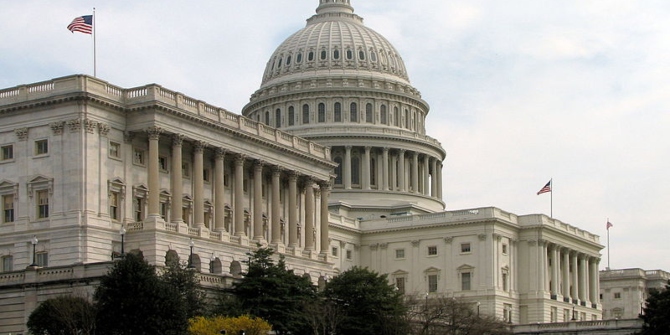 Bernie Sanders came out of the Nevada Democratic caucuses with more than 46 percent of pledged delegates, putting the Vermont Senator in a strong position in the nomination race ahead of Super Tuesday next week. Ronald Ranta writes that depending on how former Vice President Joe Biden performs on Super Tuesday, Sanders may win the Democratic nomination outright or face a brokered convention in July.
Bernie Sanders came out of the Nevada Democratic caucuses with more than 46 percent of pledged delegates, putting the Vermont Senator in a strong position in the nomination race ahead of Super Tuesday next week. Ronald Ranta writes that depending on how former Vice President Joe Biden performs on Super Tuesday, Sanders may win the Democratic nomination outright or face a brokered convention in July.
- This article is part of our Primary Primers series curated by Rob Ledger (Frankfurt Goethe University) and Peter Finn (Kingston University). Ahead of the 2020 election, this series explores key themes, ideas, concepts, procedures and events that shape, affect and define the US presidential primary process. If you are interested in contributing to the series contact Rob Ledger (ledger@em.uni-frankfurt.de) or Peter Finn (p.finn@kingston.ac.uk).
Bernie Sanders’ victory in the Nevada Caucus raises the question of whether anyone can stop him from clinching the Democratic nomination, a prospect that is sending the party’s establishment into panic mode. Except for Hillary Clinton in 2008, recent victors of the Democratic Nevada Caucus have gone on to win the nomination. At this stage of the race, and with Super Tuesday looming, the two likeliest outcomes are either an outright Sanders win or a brokered Democratic convention, more on that below.
At the beginning of the Democratic primaries, it appeared unlikely that Sanders would win the nomination. Former Vice President Joe Biden was argued to be the front runner; Senator Elizabeth Warren of Massachusetts the more likely to lead the progressive wing of the party. It was claimed Sanders had low support among minority voters; and that his message did not resonate beyond his core supporters. If that was not enough, his health was questioned after suffering a heart attack in October 2019.
Sanders’ decisive win in Nevada put an end to those questions. He won just under half of the votes and two thirds of the delegates; primaries are measured by the number of delegates candidates win. His victory was down to two main factors. First, if you exclude older and more conservative Democratic voters, Sanders managed to cobble together a broad base coalition. He did well among African-Americans, won just over half of the Latino vote, and won among white voters without college education, a core constituency of President Donald Trump. The second factor that enabled his victory, and which is crucial for thinking about the rest of the primaries, was the lack of a clear challenger.
The first three primaries, in Iowa, New Hampshire and Nevada, were supposed to winnow the pool of candidates to two or three contenders and provide them with the necessary momentum and resources to battle it out for the nomination. This did not happen, the pool of candidates had grown with the emergence of billionaire and former Mayor of New York Michael Bloomberg, who entered the race late and chose to skip the first four states. His unorthodox strategy consists of spending over half a billion dollars, more than all other candidates combined, on campaign advertising, focused primarily on Super Tuesday. This had led to accusations that he is trying to buy the nomination.
The winner of the Iowa caucus, the former Mayor of South Bend Indiana, Pete Buttigieg, who also came second to Sanders in New Hampshire, has been unable to generate any momentum or consolidate the moderate wing of the party behind him. Buttigieg came third in Nevada, after Sanders and Biden, and is polling in single digits in South Carolina, the next primary state. Many democratic voters worry about his lack of support among minority voters – most voters in South Carolina and in several key Super Tuesday states – and whether voters are ready to elect a gay president. This has left the field wide open with five candidates polling at or above ten per cent nationally (as of the time of writing, Sanders averages 27 percent, Biden 16 percent, Bloomberg 16 percent, Warren 13 percent, and Buttigieg 10 percent); two other candidates, Senator Amy Klobuchar of Minnesota and Billionaire and liberal philanthropist Tom Steyer are polling in single digits. Given Buttigieg’s weakness with minority voters and the fact that Biden and Bloomberg appear to be competing for the same voters, Sanders is in prime position to win the most delegates on Super Tuesday.

“Bernie2020_RichmondCA_IMG_9381-1” by Peg Hunter is licensed under CC BY NC 2.0
Super Tuesday is the first Tuesday in March in which many states hold their primaries; the exact number of states changes each election. This year’s Super Tuesday is particularly important because of the inclusion of the two most populated states, California and Texas, and the fact that over a third of all delegates will be awarded. The other states holding their primaries on Super Tuesday are Alabama, Arkansas, Colorado, Maine, Massachusetts, Minnesota, North Carolina, Oklahoma, Tennessee, Utah, Vermont and Virginia.
In order to win delegates in a state, candidates need to secure at least fifteen per cent of the vote. Given that Sanders is polling at or over 25 percent in most of those states, and other candidates might not reach fifteen per cent, he could end up securing more than half of all delegates. In the polling that has been done for Super Tuesday, Sanders has the lead over Biden and Bloomberg in Texas and California, a clear indication of his strong support among Latino voters, as well as in Virginia and North Carolina. Sanders is also in the lead in Colorado (a state he won in 2016), Massachusetts (over Warren), Maine, Utah and Vermont (his home state). The only states in which he is not in the lead are Minnesota (he is neck and neck with Klobuchar), Alabama and Arkansas. In an ironic twist, Bloomberg, who cited the possibility of Sanders winning the nomination as one of his main reasons for entering the race, might end up, courtesy of taking votes from other candidates, particularly Biden, as the main reason Sanders wins.
Where does this leave the Democratic race? At this stage, and given that none of the main candidates appear willing to withdraw, it is hard to see any candidate gaining more delegates overall than Sanders; though, if Biden performs poorly in South Carolina, a state he has referred to as his firewall, he might face calls to withdraw. This means Sanders will either win the nomination outright or Democrats will be heading for a brokered convention. In a brokered convention all the delegates and some party officials will vote to select the nominee. Sanders’ camp has already indicated that the candidate with the most delegates, most likely to be Sanders, should get the nomination. Some candidates, particularly Bloomberg, appear to be viewing a brokered convention as a way of securing the nomination.
Moderate Democrats fear that Sanders will be a weak nominee and a drag on many Democrats down the ballot, possibly even leading to the loss of the House of Representatives, currently held by the party. While these fears might be justified given some of the positions held by Sanders, it is not yet evident in the polling. Most polls have Sanders beating the President nationally and in most of the battle ground states. What is clear is that a vote to deny Sanders the nomination at a brokered convention could play directly into the hands of President Trump.
Please read our comments policy before commenting.
Note: This article gives the views of the author, and not the position of USAPP – American Politics and Policy, nor the London School of Economics.
Shortened URL for this post: http://bit.ly/2HZz283
About the author
 Ronald Ranta – Kingston University
Ronald Ranta – Kingston University
Ronald Ranta is a senior lecturer in politics and international relations as well as the politics department’s postgraduate programme coordinator and course leader for the MSc in international relations.






